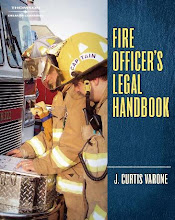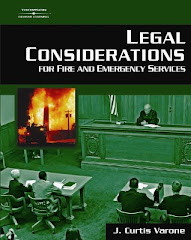The ultimate role of any attorney is to help a client make good decisions. The attorney’s role is not to supplant or replace the client’s decision-making responsibility. There are several ways that a fire service leader’s decision-making responsibility can be subverted even by a well-intentioned attorney.
First of all, some people are intimidated by lawyers, and all too willingly defer to their analysis of the facts and law. Second, some lawyers are impatient, and render an opinion before the client provides all of the pertinent information necessary to formulate a competent opinion. Third, fire departments are complex organizations that operate in a highly regulated and high profile environment compared to many industries. Even under the best of conditions, it will be rare that an attorney will be able to fully appreciate all of the organizational ramifications of a decision impacting fire departments. The larger and more complex the fire organization, the more significant the potential for the attorney to miss certain aspects of a problem.
Lastly, the distinction between the role of the attorney in providing advice and role of the leader in making a decision frequently becomes blurred. When this occurs, the attorney’s advice can be misinterpreted as to what can and cannot be done. However, recognizing the distinction between the role of the attorney and the role of the leader will help to keep the issues clear. Consider the following:
A person comes into a fire chief’s office demanding to see a copy of a state mandated hazardous materials contingency plan. The person threatens to go to the state’s attorney general if the document is not produced. The chief, who is angered by the person’s arrogance, does not know if such a document exists and refuses to release any such information. He takes the person’s name and contact information and informs him he will have the city law department contact him. As soon as the person leaves, the fire chief checks with the chief in charge of hazardous materials to make sure the plan exists, and then contacts the city attorney. The city attorney advises that the state open records law requires that the fire department produce a copy of the document within 10 days of a request. The attorney further advises the chief that failure to comply with the open records law could result in a substantial fine and unwelcome publicity.
The advice provided in the above scenario relates to a clear question of law mandating a specific course of action. There are no viable alternatives, and there are no grey areas. It is simply a question that if X occurs, Y is the solution. Upon receiving the advice, the fire chief’s options are clear, as are the consequences for failing to comply. The role of an attorney in such a situation can often be confused with being a decisionmaker because the attorney’s advice clearly points toward one particular course of action. Once the chief understands the lawyer’s advice, the decision is clear.
Not all situations calling for legal counsel are so clear. Many - if not most – legal questions that arise involve not only a technical question of law, but also some degree of judgment and discretion. Such questions may also require the consideration of important organizational and leadership values. Consider the following situation.
A ladder company’s aerial ladder is broken and out of service. No reserve trucks are available and it will be several days before a part will be available to make the needed repair. The truck is safe to drive, but the aerial cannot be raised or utilized. The truck carries an assortment of ground ladders, tools and equipment, including the jaws of life. The chief has the option of allowing the truck to remain in service without its aerial (often called “city-service”), assigning the personnel a utility van to use so they can respond fires as manpower with limited equipment, or place the unit out of service. The fire chief read about a case from
The above scenario implicates considerations and values that go far beyond the facts that are presented. However, the attorney’s advice will be based upon the facts that are provided by the fire chief. Some chiefs may even dispense with the facts and present the attorney with a narrow technical question of law: can the city be legally at risk if the ladder truck is allowed to remain in service without an operational aerial, and it is called upon to effect a rescue requiring use of its aerial ladder? The problem is that from a fire service leadership perspective there is a much larger question that needs to be addressed: What is the best alternative for the citizens and the firefighters?
Admittedly, allowing a ladder truck to run city service creates a liability risk in the event of a fire with people trapped, where as leaving the company in service as manpower only with a utility van, or placing the unit out of service completely may not. However, there is also a risk (both legal and moral) associated with placing the unit out of service completely, or placing the personnel in service in a utility vehicle with minimal equipment. Such a risk may not be apparent to some attorneys, depending upon how the facts and the legal issues are presented.
The fire chief, as the leader, has an obligation to consider the legal aspects as one among a multitude of considerations that go into a decision. Viewed a different way, this same scenario implicates the importance of giving the attorney all of the information needed to provide sound advice. If the lawyer is not informed (or worse – does not understand the implication of the fact) that the ladder company carries the jaws of life and other life-saving equipment, and that placing it out of service places those other needed items out of service as well, then the lawyer’s advice may be skewed in the direction of avoiding the only perceived liability risk associated with the decision.
Underlying the conflict between liability and leadership is the fact that lawyers are trained to view their role as helping the client avoid potential liability. This perspective is as fundamental to a lawyer as “put the wet stuff on the red stuff” is to firefighters. However, lawyers are not necessarily skilled in understanding fire department operations, the organization culture of a fire department, or matters affecting morale. The lawyer’s perspective of avoiding risk may at times conflict with the leader’s obligation to lead.
Leadership necessarily involves taking risks. Consider the following situation:
A fire department begins a program of installing smoke detectors in private homes. A grant provides for the purchase of a large number of detectors. A press release is issued encouraging the public to call the fire department and request that detectors be installed. In addition, firefighters are encouraged to offer to install smoke detectors in any residential occupancy they enter that does not have them. Almost immediately upon implementation of the program a concern is raised about exposing the department and members to potential liability.
Quite obviously, such a smoke detector program creates the potential for liability for the department and members that otherwise would not exist. Just as obviously, people’s lives may be lost if the department does not adopt such a program. The decision to adopt such a smoke detector program should not be made without consideration of the potential liability risk, but it truly involves so much more – not the least of which are the values of the organization and its leadership.
In any such situation, a risk-benefit analysis must be conducted. Conducting such a risk-benefit analysis is the responsibility of the fire department leadership, and should not be left to the lawyers (who may not share the same values nor understand all of the factual details). A good analogy for the role of an attorney in such a situation is that of a surgeon in advising a patient. The surgeon should discuss with the patient all of the options available, but ultimately the decision must rest with the patient. The risk-benefit analysis should not be short circuited by a lawyer’s overriding concern about avoiding liability, but rather must be made by the fire department leadership after taking all relevant factors into account.
The smoke detector scenario helps us to further distinguish the proper role of an attorney compared to the leader. By working with the attorney, potential liabilities can be identified, and steps can be taken to effectively manage the risk through the adoption of proper procedures, training of members, and documentation. In this regard it is vital that the leader provide all of the pertinent information to the attorney. The attorney may not initially recognize the organizational significance of a particular course of action. In some cases it may be impossible to fully brief the attorney on all of the details – some of which inevitably involve value judgments by the leader. A leader should never defer such a decision to an attorney, but rather should work with the attorney to ensure that the right decision is made for the organization.

